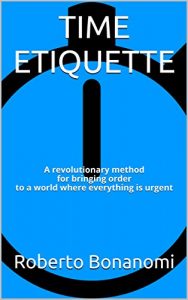Many people find difficult to organise their activities in a world where everything is urgent.
Often we are so overburdened with daily requests to overlook, or continuously postpone, also the most important projects.
When it seems to have found a moment for ourselves and our desires (or even just to rest), here that we are interrupted by a few phone calls or "very urgent" emails that immediately bring us in the operation.
We constantly live in chaos, by acting mainly in a reactive manner by jumping from an interruption to the next.
This chaos is present both in personal life and at the work place. The latter, moreover, penetrates more and more in the first: for the business everything is priority and must be done "yesterday", "asap" or according to some other colourful expressions.
Unfortunately, the misuse of technology (email, chat, sms etc.) and of socialisation environments (open space) has made communication even more chaotic in organisations, and has led to invade the private spaces too!
And it is not just a feeling.
According to a research by McKinsey Global Institute mentioned by the New York Times, US corporate managers spend 28% of their working day checking emails, on average 74 times a day.
A research by Jabra detected a real paradox of companies that, if, on one hand, seek to create productive environments, on the other, they underestimate the presence of distractions in the workplace. For example, about half of respondents (46%) condemns open space, convinced that noise is a major cause of distraction followed by interruptions from colleagues (46%), while 28% are bothered by too many emails.
Many organisations run for cover, trying to safeguard both the productivity of their employees and their personal lives.
Unfortunately, beyond laudable intentions, these interventions appear unrelated to a rational logic universally shared. Sometimes the actions seem even contradictory and seem not to consider the growing internationalisation of organisations.
This book brings order in the chaos by proposing an integration between two methodological approaches, in the personal and work sphere.
On a personal level, it is proposed to adopt the methodology and technology tools described in detail in the text, indispensable to plan and effectively manage your own activities, projects and your dreams.
On an organisational level, it is proposed to follow a new, revolutionary way to manage interactions between people through a set of rational rules on the use of time and the channels of communication, called TIME ETIQUETTE.
The two approaches are integrated, they benefit of each other’s use, although they can also be implemented independently.
Several organisations are already adopting this approach successfully and are extending to all their workers. Conversely, many people who have begun to take on a personal level these methods, now they are proposing it to their organisations. Generally, these proposals to the organisation are very well received as they introduce undeniable benefits at no cost.
I hope that this book will also bring you the same benefits, both personal and organisational.
I hope you enjoy the read.
Often we are so overburdened with daily requests to overlook, or continuously postpone, also the most important projects.
When it seems to have found a moment for ourselves and our desires (or even just to rest), here that we are interrupted by a few phone calls or "very urgent" emails that immediately bring us in the operation.
We constantly live in chaos, by acting mainly in a reactive manner by jumping from an interruption to the next.
This chaos is present both in personal life and at the work place. The latter, moreover, penetrates more and more in the first: for the business everything is priority and must be done "yesterday", "asap" or according to some other colourful expressions.
Unfortunately, the misuse of technology (email, chat, sms etc.) and of socialisation environments (open space) has made communication even more chaotic in organisations, and has led to invade the private spaces too!
And it is not just a feeling.
According to a research by McKinsey Global Institute mentioned by the New York Times, US corporate managers spend 28% of their working day checking emails, on average 74 times a day.
A research by Jabra detected a real paradox of companies that, if, on one hand, seek to create productive environments, on the other, they underestimate the presence of distractions in the workplace. For example, about half of respondents (46%) condemns open space, convinced that noise is a major cause of distraction followed by interruptions from colleagues (46%), while 28% are bothered by too many emails.
Many organisations run for cover, trying to safeguard both the productivity of their employees and their personal lives.
Unfortunately, beyond laudable intentions, these interventions appear unrelated to a rational logic universally shared. Sometimes the actions seem even contradictory and seem not to consider the growing internationalisation of organisations.
This book brings order in the chaos by proposing an integration between two methodological approaches, in the personal and work sphere.
On a personal level, it is proposed to adopt the methodology and technology tools described in detail in the text, indispensable to plan and effectively manage your own activities, projects and your dreams.
On an organisational level, it is proposed to follow a new, revolutionary way to manage interactions between people through a set of rational rules on the use of time and the channels of communication, called TIME ETIQUETTE.
The two approaches are integrated, they benefit of each other’s use, although they can also be implemented independently.
Several organisations are already adopting this approach successfully and are extending to all their workers. Conversely, many people who have begun to take on a personal level these methods, now they are proposing it to their organisations. Generally, these proposals to the organisation are very well received as they introduce undeniable benefits at no cost.
I hope that this book will also bring you the same benefits, both personal and organisational.
I hope you enjoy the read.






